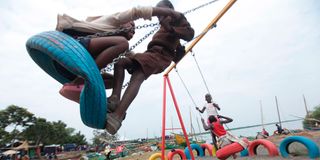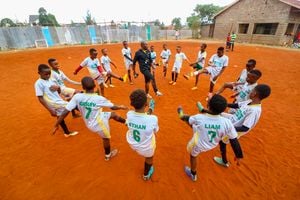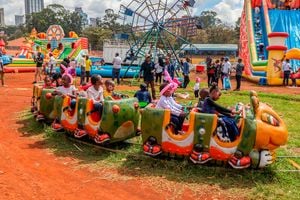
School children play at Dunga Beach in Kisumu County during the holidays.
Schools have started closing this week, marking the beginning of a 10-week holiday that will stretch to January 6 2025 when learners will return to begin a new academic year.
The end-of-year holiday will be longer than the third term that is ending and was only nine weeks. Long breaks away from school come with attendant challenges, especially for parents as they look for activities to keep their children busy and away from trouble.
The official closing date is Friday, September 25, 2024, but some schools have already released the students. The just-concluded academic term started on August 26 2024.
As learners proceed for the long holidays, candidates for the Kenya Primary School Education Assessment (KPSEA), the Kenya Intermediate Level Education Assessment (KILEA) and the Kenya Certificate of Secondary Education (KCSE) examination will remain in school to undertake the various tests.
Oral tests
Grade 6 learners will undertake the KPSEA from October 22 to November 1, 2024, alongside those under the stage-based curriculum who will do the Kenya Intermediate Level Education Assessment (Kilea). KCSE examinations have already begun with practicals and oral tests for electives while the common papers will begin on November 4 2024 and end on November 22 2024.
The chair of the Kenya Primary Schools Head Teachers Association (KEPSHA), Johnson Nzioka, urged parents to make the most of the break by spending quality time with their children. He backed the government ban on remedial classes, which leaves many schools without the option of offering extra lessons during the holiday period.
“This year has felt incredibly long, and we want to give our students a well-deserved break. We do not plan to hold remedial classes, especially since the government has warned against and banned them. However, we encourage teachers to assign homework for students to complete while spending time with their parents,” said Mr Nzioka.
He emphasised the importance of parents using the time to bond with their children, highlighting the challenges of modern life that often limit family interaction.
“We hope this will create an opportunity for parents to bond and engage with their children. In the past, many parents have been too busy with work to spend quality time with their children, but now is the perfect moment to reconnect,” he said.
The chair of the National Parents Association (NPA) Silas Obuhatsa called on parents to take a more active role in their children's lives during the holiday season.
Leisure
Mr Obuhatsa emphasised the importance of preparing children for school, both academically and emotionally, while also allowing time for leisure and development.
"We want to stress that parents have a critical role to play. As schools open in January 2025, we expect that all children will report back to school,” he said.
NPA chairperson encouraged parents to structure their children's time wisely during the break, ensuring that planned activities include opportunities for recreation.
“Sometimes, parents are too strict and don’t allow their children to go out and play. We urge parents to programme activities for their children, but also encourage playtime as part of these schedules,” he added.
He called for mentorship, both within families and through institutions like schools and churches and discouraged the use of extra tuition during the holiday period.
"Parents should establish mentorship programmes for themselves and their children, even involving schools and churches, under proper supervision. We do not encourage tuition during this break. Instead, parents should focus on building relationships with their children, involving them in everyday activities such as cooking,” he said.
Mr Obuhatsa also underscored the need for parents to take full responsibility for their children's safety and well-being.
“Parents need to know what time their children are leaving and returning home. Anything that happens to their children during this period is their responsibility,” he said.
Ms Mary Wanjiku, a mother of two from Nairobi County, expressed her concerns about the long holiday, noting the challenges of keeping her children engaged for such an extended period.
“I’m worried about how to balance their time between resting and staying productive. Ten weeks is a long time, and with no remedial classes allowed, I’m anxious and considering the economy right now. We’ll try to focus on life skills, but I still wonder if it will be enough to keep them on track for the next school year,” she said.
The academic year ends with complaints by the Kenya Secondary Schools Heads Association (KESSHA) over unremitted capitation funds for schools. The association maintains that the government disbursed Sh15,192 only out of the expected Sh22,224 per learner annually.
According to a statement by KESSHA chair Willy Kuria of the Sh15,192 received, schools were directed to allocate Sh3,850 to the SIBA account for infrastructure development.
“This leaves only Sh11,342 per learner, which is inadequate, considering the funds are meant to cover a range of critical expenses, including the purchase of learning materials, laboratory equipment, and the facilitation of co-curricular activities,” he said.
Mr Kuria argued that the infrastructure fund should not be drawn from the capitation intended for tuition and operations. Instead, infrastructure development should be funded by the Constituency Development Fund (CDF) and the transition infrastructure grant fund from the Ministry of Education.
The association is now urging the National Treasury to release the remaining Sh6,000 per learner to enable schools to meet their financial obligations.
"There is already a serious financial crisis in schools, and it's not possible to complete the term if the remaining capitation is not released. Unfortunately, school staff may have to go without salaries, and the debt burden in schools is spiralling out of control,” said Mr Kuria.
“The only capitation we can speak of is the reduction in the first term’s allocation, and that remains the only remittance we are expecting,” he said.












